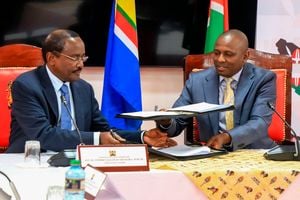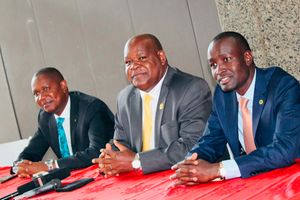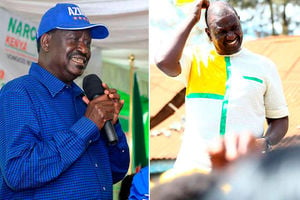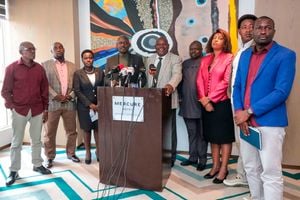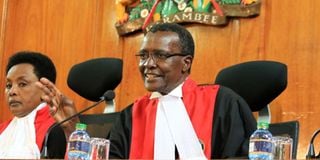
Chief Justice David Maraga (right) and his deputy Philomena Mwilu at the Supreme Court on November 14, 2017. The Maraga-led Supreme Court nullified President Uhuru Kenyatta's re-election and ordered a repeat vote.
President William Ruto and Azimio la Umoja One Kenya leader Raila Odinga are pushing for severe punishment for electoral offences, some of which led to the nullification of President Uhuru Kenyatta’s 2017 re-election before he won a repeat vote.
The Election Offences (Amendment) Bill, 2023—which stems from the National Dialogue Committee (Nadco) report—seeks to punish Independent Electoral and Boundaries Commission (IEBC) officials who hold elections in ungazetted polling stations.
Claims of use of ungazetted polling stations in the 2017 General Election formed the basis for the petition that saw Mr Kenyatta’s re-election nullified. Mr Odinga refused to participate in the ordered repeat poll on same basis.
The Bill also spells out punishment for poll officials who deliberately delay to declare election outcomes in their polling stations.
“Clause 2 of the Bill to amend Section 6 of the Act to provide that it shall be an offence for members and staff of the Independent Electoral and Boundaries Commission to conduct or hold an election in ungazzetted polling stations,” provides the Bill currently before Parliament.
“Further, the Clause creates offences for members and staff of the Commission who unreasonably delay in declaring elections results or knowingly alter declared election results,” it adds.
The Bill is sponsored by Majority Leader Kimani Ichung’wa and his Minority counterpart Opiyo Wandayi in the National Assembly. In the Senate, it is sponsored by Majority Leader Aaron Cheruiyot and Minority Leader Stewart Madzayo.
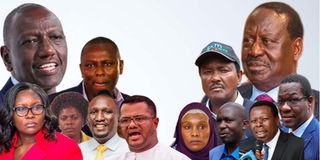
President William Ruto (top left) and his Kenya Kwanza talks team and Azimio leader Raila Odinga (top right) and his team.
The proposed law provides that an official who commits such offence would be “liable on conviction, to a fine not exceeding two million shillings or to imprisonment for a term not exceeding five years or to both”.
Further, a poll official who “makes, in any record, return or other document which they are required to keep or make under such written law, an entry which they know or have reasonable cause to believe to be false, or do not believe to be true” will also be punished.
Allegations of forms 34As being altered or fed with wrong results have been at the heart of rigging claims in previous elections.
Other offences in the Bill include wilful counting of a ballot paper as “being cast for any candidate which they know or have reasonable cause to believe was not validly cast for that candidate”, collusion with a political party or candidate for purposes of giving an undue advantage in the election and wilfully refusing to count a validly cast ballot paper.
Claims that unregistered polling stations were used to manipulate the 2017 contest between Mr Odinga and Mr Kenyatta found its way to the Supreme Court petition, which in an unprecedented decision, annulled the election.
“It also emerged during the hearing of the petition that IEBC used polling stations which were not gazetted in accordance with the law and regulations. It is important to have full clarity in relation to the voters’ register and the polling stations,” said Mr Odinga when he issued his irreducible minimum for participating in the repeat poll.
“We demand that the IEBC gives access to and publishes all reports of the transaction logs in relation to the persons identified using the KIEMS system and all persons identified through complementary methods,” he added.
In the presidential petition, the Supreme Court was told by Mohamud Noor Bare and Ibrahim Mohamed Ibrahim, through affidavits, that the commission “illegally and fraudulently established un-gazetted polling stations in Mandera County which were manned by un-gazetted and undesignated returning and presiding officers”.
The commission, however, refuted the claim, stating that it published all the polling stations in each of the 290 constituencies.
The poll body went ahead to term as baseless the claim that results from un-gazetted polling stations were included in the final tally in determining the winner.
But the petitioners highlighted various discrepancies, for instance that there was transmission of results from slightly more than 11,000 polling stations gazetted, contrary to Regulation 7.
It was also alleged that the streaming of results commenced a few minutes after 5pm being the official closing time for all polling stations. Further, the petitioners questioned the streaming of results in constant percentages of 54 per cent and 44 per cent in favour of Mr Kenyatta.
In addition, the petitioners faulted the late publication of the public notices at polling stations that lacked network coverage for being “unlawful, arbitrary and non-verifiable”.
They told the Supreme Court that it was contrary to the “requirement of 45 days publication before the General Election, which was in breach of Regulation 21, 22 and 23 of the Elections (Technology) Regulations 2017”.
An affidavit by James Muhati, an IEBC official, stated that following a mapping exercise carried out by the commission and subsequent analysis by mobile network operators, it was ascertained that about 11,155 polling stations were not effectively covered by either 3G or 4G network. The commission said the information was sent out to the public days before the elections.
He stated that it thus became necessary to instruct presiding officers to ensure that they move to points where there was network coverage or in the alternative to constituency tallying centres in order to transmit results.

